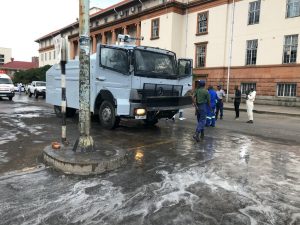This blog focuses on the ‘self-contained’ A1 farms, with a sample size now of 78. These are found in two sites in Gutu and Masvingo districts, and are in many ways the most successful in our sample. The number of exits is relatively small (only three since our first survey), and households have held onto the farms, very often with women taking over from husbands who have passed on. Currently there are nearly 30% of all households where women are the household head, many of whom have their own business (30% of all households with a female-run business contributing to household incomes), while 23% of households include women who are part of organised groups, and 18% have women who are in leadership positions. On our visit to Clare farm in Gutu district, we met Mrs BB. She explained how they had built up the farm:
When we came we had one scotch cart, one plough and we brought one heifer. My husband was working at that time. In 2005, we bought a pump from his salary and started developing our gardens, selling tomatoes to local boarding schools. Cattle multiplied and by 2007, we had 13. We also had more kids to help us on the farm too! My last child was born in 2012, and I have five. Now we have three pumps, although one is broken, and also a sprinkler and a large water storage tank. In 2016, we drilled a new borehole and aim to put in a submersible pump. In 2018, we bought a truck, which I can drive (she demonstrated, see below). All of this is from selling vegetables, as well as maize, and we sold five beasts for university and school fees. The kids are now getting older. One has banking and finance degree, and another has his own plot in a nearby resettlement and is doing well. The younger ones are in boarding schools. Our kids’ education was paid for by the farm, as well as a fine white wedding for our first-born in 2015. We also relocated our homestead to be nearer the horticulture plots and built new houses, buying a sofa, beds, wardrobes and a fridge.

Some self-contained farms were favoured by influential figures during the land invasions and 28% of all households are occupied by former war veterans. Many residents came from urban jobs, with 72% previously having jobs off-farm. This is now down to 54%, but links to off-farm employment are important. Overall, the population is relatively well-educated (59% having continued in schooling beyond Form II) and 27% of household heads have been trained in the Master Farming Certificate.
The average age of household heads in these farms is 52, and 46% of households have grown-up children aged between 21 and 30, a fifth of whom are out of the country, while 14% are now farming, very often on subdivisions of parents’ plots. Remittance income is received by about a quarter of households, but for most it is agricultural production that is the core of livelihoods. On average, 6.6 hectares is cultivated in a farm averaging 35.1 hectares in total. There is some rental of land in the area, but this is not significant. As one of our informants explained, “there is no space here now, and we are holding onto the land…. We may rent out a little to teachers and others who need a small plot, but otherwise it’s for the family”.
On average, households in these areas produce about two tonnes of maize and sell between 600-900 kg in the period between 2017 and 2019 (although with large variations in output and sales). Half of all households produced more than one tonne of maize, which is sufficient to feed a family. This is relatively intensive production, with between 65% and 80% applying inorganic fertiliser, and nearly all applying manure from the growing livestock populations. Given the poor sandy soils in the area, and despite the high level of tree cover still present, additional work to maintain soil fertility is important, especially in the Clare farm area, and a quarter of households had invested in soil conservation works on their farms in the past five years.
Although there is differentiation across households, a significant number are ‘accumulating from below’, and reinvesting surplus in agricultural production, including the hiring of labour. 44% of households have permanent male labour living and working on their farms (only 8% have permanent female labour), while around a third regularly hire temporary labour. Agricultural production focused on maize is complemented with horticulture, making use of the rivers that run through these sites, with around a third regularly producing for market, with an average income of US$1200 across all households (again highly differentiated). Cattle production is important – both for sale (38% of households sold in the past year) and for draft power (68% used their own cattle for draft in 2019). Quite a few households specialise, linking production to market. There are some who stick to maize, and other field crops, while others have invested in intensive irrigated horticultural production, some with contracts to supermarkets and with traders. Large church gatherings, notably the annual event at Serima Mission, are important marketing opportunities.

Mr and Mrs M from Wondedzo Extension showed us round their impressive horticulture farm, recently the site of a field day organised by a private sector company, and attended by extension workers and others. Mr M had been a bus driver before, and had chucked in his job in 2015, investing in a borehole on his farm. Today nearly two hectares are irrigated, with a huge range of vegetables, from beetroot to butternut, with an attempt to capture the higher value markets in Masvingo. We continued to Mr and Mrs MV who explained the story of their farm:
We came from Bikita with six cattle. They increased to 30 or more as there’s plenty of grazing here. We cleared a large area of land – up to 15 hectares – and grew and sold maize for many years. We bought a truck from selling. We also sold cattle – for example, last year we sold cattle and paid for a 50m borehole near the home, plus building the pump house and fencing. It cost US$4000. We currently have four pumps, and cultivate about two hectares near the Mtirikwi river. It is very profitable, and we are now down-sizing our maize production area, as prices change all the time and it’s difficult to plan. From profits from farming we bought a plot in Rujeko C in Masvingo. It has been a long project since 2006, but is now complete, and we have just bought barbed wire to fence the plot.
Mr MV is a local head teacher, and he says he wants to retire soon. “Farming pays much better”, he says. “But it needs time and commitment… We lost 5000 cabbages last year from cattle wandering into the field, as we were not supervising well. You also have to focus on workers. We employ a number, but they soon leave. Their aims to buy a mobile phone, then they go”. Given the level of production they achieve, they frequently send food regularly to the communal areas, and their home in Bikita, supporting a wider network of relatives beyond the immediate family. “This isn’t just ordinary farming: it’s commercial farming!”, Mr MV exclaims.
Across our sample, other common income sources include milk sales (17% of households), goat sales (15%), poultry sales (29%), trading (13% – mostly of vegetables to local towns) and house rental (14%), as a number of farmers have bought plots in nearby towns following good crop sales. These diverse income sources are added to by occasional examples of natural resource based harvesting and crafts, and are highly differentiated among households and by gender. Very few rely on institutional credit/loan finance, although around 18% had managed to secure command agriculture finance for seed/fertiliser, while only one farmer had a private contract for crop growing, so inputs and investment are derived from farm surpluses or off-farm work.

Increasingly in these areas a local economy is developing. Mr MV from Wondedzo Extension observed: “We no longer go to town… there are others who supply things. The Vapostori (members of the Apostolic church) have many businesses. They are very entrepreneurial. They can fix things, supply things. They have such big families, so have much labour for farming and other activities”.
Investments in the past five years included the purchase of ploughs (31% of households), carts (26%), cattle (22%), pumps (28%), solar panels (53%) and transport, notably cars (24%). By 2019, 74% had built a protected well near their homestead and 82% had a Blair-type latrine with a roof, and all had improved housing, with electricity for lighting supplied by solar and battery combinations in nearly all. Many also had multiple dwellings with cross-generational families living on the plots, with farms supporting growing numbers.
Overall, conditions are good in these areas, and people comment on how their lives have improved significantly. Mrs BB from Clare farm commented:
Nearly everyone here has cars – except for a few, such as the civil servants with jobs that don’t pay. Those who say farming doesn’t pay are talking rubbish! Even the graduates are coming back to farm. My husband has a local government post and is paid very little. I don’t worry about his small money. He has to borrow money from me. I am the farmer! My husband earns US$80 a month, but I can earn US$800 a day!
The main complaints focus on conflicts with those who come from nearby communal and A1 areas to poach graze, harvest wood and steal fencing. The governance arrangements retain the old ‘Committee of Seven’, established during the period of invasion, but this is combined with more formal systems, including councillors and other post holders. Struggles over chieftaincy boundaries have plagued the new resettlements, and our sites are no exception. The lack of infrastructure development in these areas reflects the absence of the state. Informal roads criss-cross the area, and people have to walk long distances to get a bus. As one informant from Wondedzo complained: “We had a grader come for our road, but only once. We have to maintain it ourselves. The government supports the schools and local clinic, and we do see the extension officer and the vet occasionally, and some receive support from Command or the Presidential Scheme, but we are mostly on our own!” For some, this absence of state involvement is seen as an advantage. One informant commented on the recent visit by an audit team: “It was a waste of time, they came to collect information, but I said at the meeting, just look around, we are doing well!”
While there is a clear pattern of differentiation emerging both within these areas and between the self-contained schemes and others, the self-contained farms are by-and-large booming, with regular maize harvests – some very significant; the highest across the four years we collected data for in this round (2016-2019) was 20 tonnes, with 16 tonnes sold, combined with an important focus on intensive horticultural production.
Since the farms are self-contained, with less than a quarter of the area cultivated and the rest grazing, and because of the haphazard nature of bush roads, for those visiting for the first time, they might assume that these areas are under-used and of low productivity. But this would be wrong. There is significant investment, including in relatively luxury goods like cars and trucks, and the housing stock is impressive across the areas, even if scattered in what some would deem ‘just bush’. As MV from Wondedzo Extension commented:
We expect great riches in 20 years’ time. The future is definitely irrigated horticulture. If we sink more boreholes and diversify and intensify our production, people will be rich and lives will improve, even from the next generation, as you only need a few hectares. One of my sons has a plot here and is growing sugar beans, very successfully.
Those who are accumulating from below – probably over a half of all households – are investing in the farm, and are employing others in the area (although most employment comes from nearby communal and A1 areas). Such households also have an eye on the longer term, with purchases of plots in nearby towns and the building of rental houses. Some with older children who have not gone out of the country to seek jobs, are accommodating them on the farm, as land is subdivided a generation on from land reform. Those who are doing well are employing others (although most employment comes from nearby communal and A1 areas), as a future of intensive, commercial, market-oriented production is envisaged for these farms.
This post was written by Ian Scoones and first appeared on Zimbabweland. Led by Felix Murimbarimba, the Masvingo team is: Moses Mutoko, Thandiwe Shoko, Tanaka Murimbarimba, Liberty Tavagwisa, Tongai Murimbarimba, Vimbai Museva, Jacob Mahenehene, Tafadzwa Mavedzenge (data entry) and Shingirai, the driver. Thanks to the research team, ministry of agriculture officials and the many farmers who have supported the work over the years.
Post published in: Agriculture






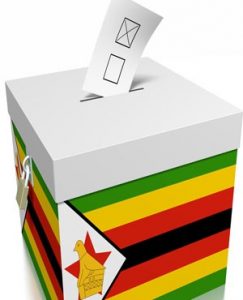




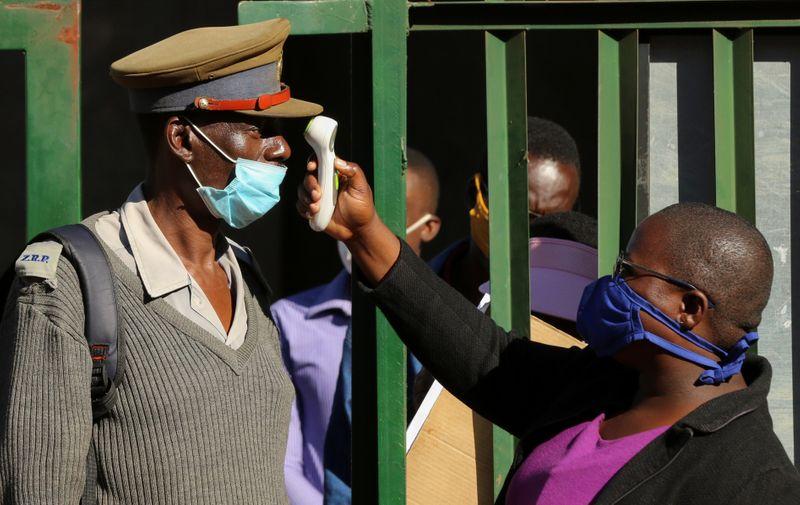



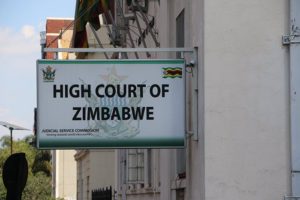



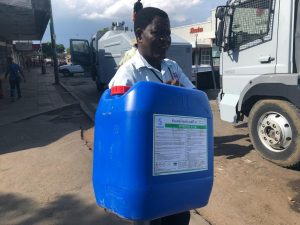
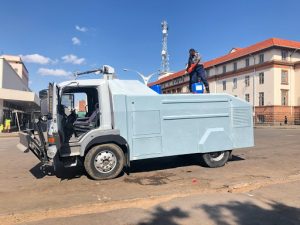 Government workers in Bulawayo, Zimbabwe mix hydrogen peroxide solution to sanitize pavement and prevent the spread of COVID-19 on April 29, 2020. (Lungelo Ndhlovu/Zenger)
Government workers in Bulawayo, Zimbabwe mix hydrogen peroxide solution to sanitize pavement and prevent the spread of COVID-19 on April 29, 2020. (Lungelo Ndhlovu/Zenger)